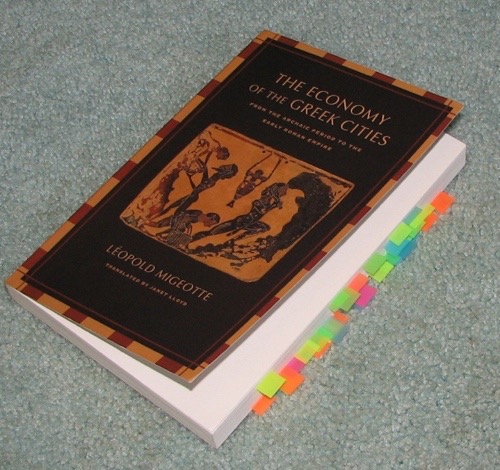by Leopold Migeotte
I’m always on the lookout for books that might help me with my work on the History of Thinking, so when I saw this baby, I knew I had to have it. It pertains directly to the most original part of my explanation, the development of trade of oil and wine for grain that I believe was responsible for both the demographic explosion around 900 BCE and the subsequent development of rationalism among the Greeks.
I hate marking up books with highlighter pens. In the first place, it defaces the book; in the second place, it can only be found later by going through the book page by page. I prefer to use little sticky colored tags that protrude out from the edge of the book a centimeter or so. The measure of a book’s value to me, then, is the number of sticky tags I attach while reading it. As you can see, this book proved to be of great value:

It confirms almost everything I have written about the Greeks and trade: that the region is too mountainous to support much agriculture, that the Greeks usually positioned their cities close to the sea, and that seafood was an important source of nutrition in the early years. I found this statement especially supportive of my thesis:
“Paleopathological analyses reveal that in the eighth century health conditions improved, with a diet increasingly rich in cereals…”
That’s exactly what I predicted. The Greeks weren’t opening up new lands to cereal crops, nor did they improve their agricultural methods. They were trading their wine and olive oil for cereals. The importance of trade to Greek life is illustrated in this statement:
“The presence of a central agora in which trading took place was characteristic of Greek cities.”
Greek cities were so dependent upon grain that they enacted laws to insure its safe importation. Solon appears to have enacted a law forbidding the export of products from Athens – except for oil, the one commodity they had in abundance. Another law forbade Athenians to lend money for merchant trips other than those bringing grain to Athens. Several other Greek cities had similar laws – and these are only the ones we know about; most such laws have long since been lost. Athens went out of its way to maintain excellent diplomatic relations with the main grain-exporting kingdoms on the Black Sea.
All in all, this book comports in every way with my own thesis about the development of the Greek economy during pre-classical times. The evidence is so strong that I sometimes wonder why scholars have not yet realized that the Greek transition was due fundamentally to a system based on trading wine and olive oil for grain.
